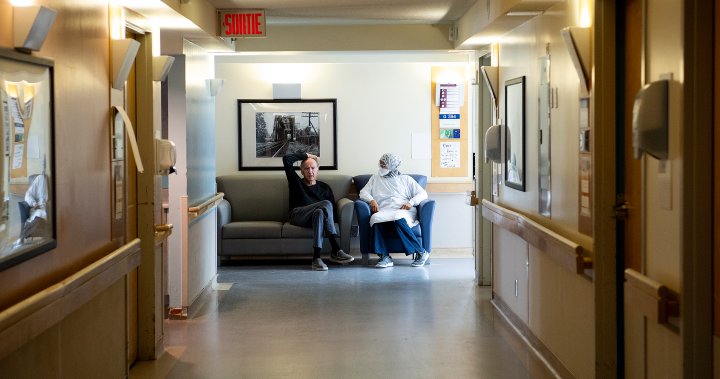
As a seventh wave of COVID-19 makes its way in Canada, long-term care facilities in some provinces are seeing a major spike in infections.
In Ontario, COVID-19 outbreaks in long-term care homes more than doubled in the first week of July, according to the province’s public health unit.
A total of 42 outbreaks were reported in the long-term care sector during the week of July 3 to 9, according to the province’s latest data.
That’s a 110 per cent increase from the previous week’s 20 reported outbreaks.
Ontario, like other provinces, is no longer reporting daily COVID cases. However, according to Dr. Kieran Moore, the province’s chief medical officer of health, the seventh wave of the novel coronavirus could peak in Ontario within the next two weeks.
Following direction from the province’s Minister of Long-Term Care, Paul Calandra, MPP for Markham-Stouffville, Ontario previously had a COVID-19 immunization policy in place for people working in, volunteering at, or visiting long-term care homes.
But, the policy was revoked in March, meaning this requirement no longer applies.
In Quebec, more than 25 per cent of patients in 38 out of 106 long-term care facilities are currently infected with the virus, according to the provinces latest data. Between 15 to 25 per cent of residents in 19 other facilities are also infected.
“Quebec is in a seventh wave of COVID-19,” Marie-Claude Lacasse, spokesperson for the province’s public health department told Global News, noting cases are expected to stabilize within the next few weeks.
“Quebec public health has urged the population to be cautious in order to reduce the spread of the COVID-19 virus as much as possible, particularly among the most vulnerable people,” the spokesperson said.
A spike in infection among health-care workers has also increased “pressure” on the province’s health network, according to the spokesperson.
A resident holds hands with a health-care worker in a COVID-19 infected ward at Idola Saint-Jean long-term care home in Laval, Que., Friday, February 25, 2022.
THE CANADIAN PRESS/Graham Hughes
British Columbia had four long-term care facilities with an active COVID-19 outbreak as of July 13, a spokesperson for the province’s Ministry of Health confirmed to Global News.
“Over the course of the pandemic, several enhanced protective measures have been put in place to minimize the risk of introduction and transmission of COVID-19 in long term care and seniors’ assisted living residences,” the spokesperson said.
“We will continue to maintain appropriate measures including enhanced screening protocols, masking requirements, infection prevention and control practices, testing, and outbreak management protocols, to protect those most vulnerable to serious illness from COVID-19.”
In Alberta, COVID-19 outbreaks were reported at 12 long term-care facilities as of July 13, according to provincial data.
This includes five facilities in the Calgary zone and one in Edmonton.
“As we prepare for the fall, Albertans can expect to see periods of increased transmission of both COVID-19 and other respiratory diseases like influenza,” Charity Wallace, spokesperson for the government of Alberta told Global News.
“As we continue to live with COVID, vaccines will continue to be critical in protecting our health, our loved ones and the health-care system. This is why we continue to encourage Albertans to get every dose of vaccine that they are eligible for,” they said.
In Nunavut, there are currently no outbreaks in long-term care facilities, the manager of communications for the territory’s health department told Global News.
Latest numbers from Manitoba also show no outbreaks in long-term care facilities, though there was an overall increase in cases reported from the previous week.
“Long-term care is the perfect storm for not only serious outbreaks but serious outbreaks with a lot of sickness and death,” Colin Furness, infection control epidemiologist and assistant professor at the University of Toronto’s Faculty of Information, told Global News.
“In a sense, this is ground zero for the worst of COVID,” he said.
To manage outbreaks in these facilities, it’s about more than wearing a mask, according to Furness.
“We need to manage the air,” he said. “We need filtration and ventilation measurements and we need it urgently.”
Though when masking, wearing respirator masks, like an N95, is important for maximum protection, according to Furness.
“In this kind of environment where people are so vulnerable, it really matters. You could put nine cloth masks on your face and it won’t work nearly as well as a respirator mask,” he said.

Another key strategy to prevent COVID-19 outbreaks in long-term care facilities is ramping up rapid testing for staff and visitors, according to Furness. Getting vaccinated is also crucial, he said.
“All vulnerable people should be cared for only by vaccinated people,” said Furness.
“The problem we have with inoculating people who are very elderly is their immune system just isn’t often able to mount as robust a response. So let’s inoculate the residents but the main thing is that the people around them are inoculated,” he added.
In Ontario alone, more than 96 per cent of eligible long-term care residents received third COVID-19 vaccine doses as of July 12, and more than 80 per cent of those eligible had received fourth doses, Mark Nesbitt, spokesperson for the provinces Ministry of Long-Term Care told the Canadian Press this week.
By the same date, more than 88 per cent of eligible staff had received third doses.
A strategy harmful to residents is locking down long-term care facilities and preventing visitors, according to Furness.
“This is enormously punitive and it really is a last resort when you have decided you’re simply not going to bother to do other things,” said Furness.
This strategy took a toll on essential family caregivers who had their abilities of seeing and caring for their loved ones in these settings limited during lockdown, according to a recent study published in both the Journal of Gerontology and the International Journal of Qualitative Studies on Health and Well-Being.
The study – authored by the University of Toronto’s Charlene H. Chu and Amanda Yee, along with Ontario Tech University’s Vivian Stamatopolous – found that poor technology, infrastructure and planning made it difficult for caregivers to care for residents properly, causing “collective trauma.”
“This was a nightmare turned into a reality for many family members,” Chu said in a statement published by the University of Toronto on July 8.
“They were already fraught with guilt having to put their loved ones into care, and now they were required to bear witness to their family member’s decline and prison-like confinement, compounded by their own sense of helplessness in the situation.”
— With files from The Canadian Press
© 2022 Global News, a division of Corus Entertainment Inc.
This news is republished from another source. You can check the original article here



Be the first to comment